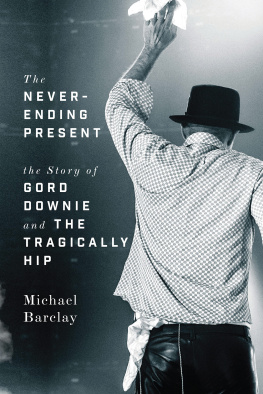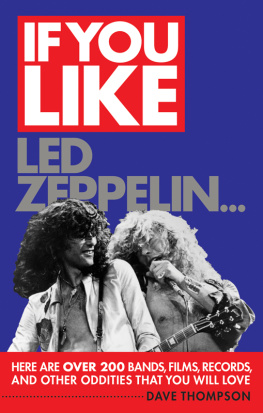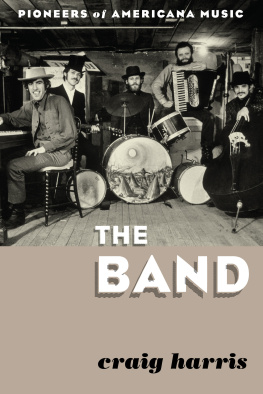Half of this book is a chronological history of the Tragically Hips career, which ended in 2017 with the death of Gord Downie. Those chapters are written in the past tense.
The other half, appearing between the chronological chapters, extrapolates on various themes throughout the bands 32-year career, quoting the bands peers and other observers speaking in 201617. Those chapters are situated in the present tense.
All chapters are written in a way that they can be read in isolation: you are invited to dip into The Never-Ending Present in whatever order you like.
Overheard backstage at a Tragically Hip show in the 2000s: Dont you go write a book about us!
In the 2012 film Bobcaygeon, an uberfan named Wesley gestures to an empty spot on his bookshelfstacked mostly with tomes about the Rolling Stonesand says, The Hip have to make a book. There is no book on the Tragically Hip, other than Gord Downies poetry. I need to put a book in that spot. Thats where its got to go. Wesley, here is your book.
The main reason why there has been no book about the Tragically Hip is because the band didnt want one. A book ossifies its subject matter, providing a punctuation marknamely a periodthat implies whatever comes after its publication is less important than what preceded it. The Hip never viewed their career this way. They were always about the next album, the next tour. Dont look back, Bob Dylan would say. Do your impression of the never-ending present, Gord Downie would say.
It is probably a good thing that little is written about writers and artists in Canada while they are alive, wrote novelist Hugh MacLennan in 1954, eulogizing his late wife, Dorothy Duncan, a writer. This peculiar Canadian attitude is fundamentally healthy, for it leaves them free to do their work and to tell and paint the truth as they see it. But it is a bad thing for the country that they are almost never written about at all, not even after they are dead, for it is only through its creative ones that a nation acquires a personality and the right to stand in history.
The members of the Tragically Hip are intensely private people who prefer to control their own narrative. They always hated talking to the press. They did not like most things written about them, or even covers of their songs. Downie in particular didnt like revealing what was behind the curtain, or even taking a peek for himself; during a 2012 CBC Radio interview, he dismissed the wildly popular autobiography of one of his rocknroll heroes, Keith Richards, for blowing the mystique. They read their reviews; they held some grudges. They were invited to participate in this project; they declined. Understandable: 2017 was an intensely emotional time for everyone in the Hip camp, although guitarist Rob Baker did give several interviews during that calendar year. Anyone can write whatever they want to write, he told the Toronto Sun on October 17, 2017. Thats fine with me. Its just not our story as we would tell it. I have no interest in a chronological history of the band or talking about who influenced us and what our influence on others might be. Its irrelevant... Never let the truth get in the way of a good story. Two months later, the band declined a request to review a fact-checking document for this book.
The few times the Hip allowed themselves to be documented in film1992s Full Fledged Vanity, 1993s Heksenketel, 2012s Bobcaygeonfeatured precious little live footage and next to no valuable interviews. Heksenketel spent more time talking to the bands bus driver and the stage crew than it did the band members themselves. Bobcaygeon was primarily a documentary about some of the Hips biggest fans, not the story of the Hip. Thankfully, 2005s That Night in Toronto was a valuable live document, and 2017s brilliant Long Time Running showed the band members at their most forthcoming and vulnerable. None of those films told the story fully and completely.
The story of the Tragically Hip does not belong only to the band. As was abundantly evident in the summer of 2016, the story of the Tragically Hip is the story of Canadian music: the people who make it, the people who make it happen, and the fans who celebrate it every day. Maybe its even the story of Canadian culture itself, from Northrop Frye to Drake, from Jacques Cartier to Justin Trudeau, and everything in between.
The story of the Tragically Hip does not belong to one person, either. Despite the prominence of Gord Downies name in the subtitle, this is a book about the Tragically Hip. They never once billed themselves as Gord Downie and the Tragically Hip, even if thats the way they were consistently portrayed in the media, even if fans have tattoos of Downies face but not Gord Sinclairs. Celebrity culture always focuses on the singer. To the chagrin of most musicians who dont front a band, that will never change. Some singers replace their entire band, keep the name and have few fans notice. This was not a group of sidemen, however. This was a democratic band who made all decisions togethergranted, some of those decisions were driven by Downie, who possessed the strong will and stubbornness found in all leaders. It was that charisma and strength that defined the final two years of his life, when Downie decided to shine a light on a dark corner of Canadian history with his Secret Path project. In doing so, he prompted a reckoning among white Canadians about their countrys shameful treatment of Indigenous people. For that and for his courage in battling brain cancer in a very public way, Downie became more famous than hed ever been; even Canadians who never even cared for the Tragically Hip were now very aware of who the singer was and what he stood for. But why did we care about this man in the first place? The story of Gord Downie is by no means confined to 201617, even if thats how he will now be remembered.
In Long Time Running, Rob Baker says, of the bands historical relationship with their singer, We always knew there was a big danger that the focus would become Gord, Gord, Gord. In a weird way, it came to pass with this [final] tour because it was unavoidable. Because of the situation, the focus was very much on Gord. That trumps the democracy. In both 2016 and 2017, it was Gord Downie, not the Tragically Hip, who was chosen as Newsmaker of the Year by Canadian Press.
Gord Downie put out his first solo record in 2001, a decision that did not go over well in the Hip camp. He put out six solo records in all, which is part of the reason why you will read more about Downie in this book than the other members. But after dragging them all into an open relationship, he was firm in his decision that their bond was until death do us part. In 2010, a Calgary Journal writer asked him straight up: Whats keeping you with the Tragically Hip? Why not go on your own completely? Downies simple response: Because I love them.










